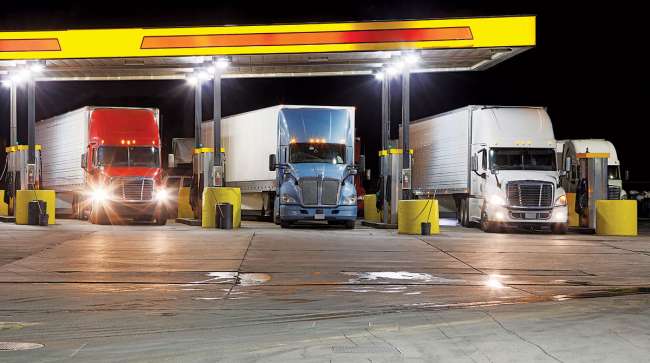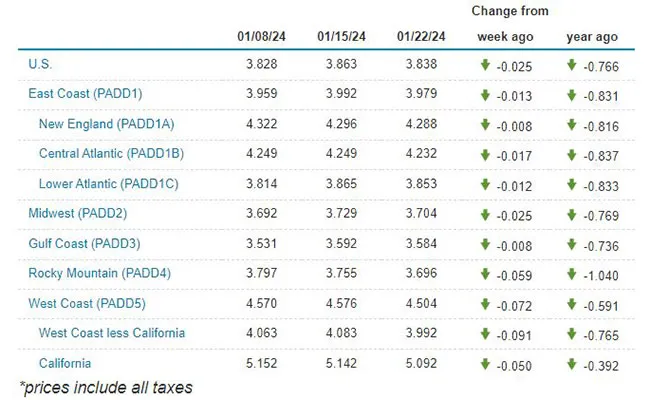Senior Reporter
Diesel Price Sheds 2.5¢ a Gallon to $3.838

[Stay on top of transportation news: Get TTNews in your inbox.]
The national average diesel price fell for the third time in the first four reporting periods in January, dipping 2.5 cents to $3.838 a gallon, according to Energy Information Administration data for the week ending Jan. 22.
Diesel’s price dropped after a 3.5-cent bump Jan. 15.
The average price has fallen in 11 of the past 13 weeks.
A gallon of trucking’s main fuel now costs 76.6 cents less than it did at this time in 2023.
U.S. average on-highway #diesel fuel price on January 22, 2024 was $3.838/gallon, DOWN 2.5¢/gallon from 1/15/24, DOWN 76.6¢/gallon from year ago #truckers #shippers #fuelprices https://t.co/lPvRNZG7iO pic.twitter.com/oL9s8tAjyq — EIA (@EIAgov) January 23, 2024
The average diesel price was lower in all 10 regions in EIA’s weekly survey. The biggest decrease was 9.1 cents in the West Coast less California; the smallest decline was eight-tenths of a cent in New England and the Gulf Coast.
One of the main reasons why fuel prices are staying lower is the price of West Texas Intermediate crude oil and other petroleum commodities are remaining relatively stable. West Texas Intermediate one year ago this week was $80.13 a barrel compared to $75.19 on Jan. 24. WTI has been in the $75-to-$80-a-barrel range for the last six months of 2023 and now for the first month of 2024, after peaking at $93.68 in mid-September.
During its fourth-quarter earnings call, Baker Hughes said it is adopting a more cautious tone in discussing its outlook for the coming year with regard to oil production than its larger energy production peers, especially with respect to North America.
“In North America, activity continues to lag, and we are now anticipating no meaningful recovery in activity during the first half of the year,” Baker Hughes CEO Lorenzo Simonelli said on the earnings call Jan. 24. “On the supply side, the biggest risk factor is non-OPEC supply outpacing demand, possibly requiring OPEC+ to maintain the current level of cuts [in oil output] through the end of 2024.”
The company also said it is broadening its efforts into energy development in areas besides oil, and Simonelli said Baker Hughes is pursuing an “all-of-the-above” strategy on the energy transition and decarbonization, “irrespective of the fuel source.” He said the company is looking at five different areas in its new energy business unit: carbon capture, hydrogen, geothermal, clean power and emissions management.
U.S. average price for regular-grade #gasoline on January 22, 2024 was $3.062/gal, DOWN 0.4¢/gallon from 1/15/24, DOWN 35.3¢/gallon from year ago #gasprices https://t.co/jZphFa0Ptd — EIA (@EIAgov) January 23, 2024
Even as domestic oil production continues to reach into record territory, several of the petroleum groups that monitor rig counts in the U.S. say that number is falling. Both the Baker-Hughes Rig Count and Enverus Daily Rig Count put the number of operating rigs between 620 and 650, down from a peak of more than 800 a year ago.
The EIA says as 2023 ended, domestic oil production was peaking at more than 13 million barrels a day and production had steadily increased in all of 2023, beginning in January when 12.56 million barrels per day were produced.
Now the EIA is forecasting even higher U.S. crude production in 2024 and 2025, at more than 13.4 million barrels per day. In its latest Short-Term Energy Outlook report the EIA says production is expected to continue creeping up because of significantly increased well efficiency.
As global oil demand has slumped and U.S. production has surged, OPEC+ members including Russia and Saudi Arabia have each slashed daily oil production by at least a half million barrels a day to prop up the price of oil, and the entire 13-member organization has cut production by 2.2 million barrels per day.
Ben Gardiner, a cybersecurity expert at the National Motor Freight Traffic Association, shares practical, effective strategies to shield your business. He offers insights into operating systems and a comprehensive guide to cyber resilience. Tune in above or by going to RoadSigns.ttnews.com.
The new production cuts take effect throughout the first quarter of 2024. “Afterwards, in order to support market stability, these voluntary cuts will be returned gradually subject to market conditions,” OPEC said.
The OPEC+ organization is in the process of getting an additional member as Brazil said this month it will begin the process of joining. It last added a full member in 2018 with the Republic of the Congo joining.
New York City officials are taking a step to lower its carbon footprint, awarding a two-year contract from Brooklyn’s Approved Oil Co. to supply renewable diesel to run vehicles in various city agencies including the sanitation department, police, fire, environmental protection, transportation, parks and recreation, and corrections. The company and city said by providing city agencies with renewable diesel the company will play an important role in driving down carbon emissions and helping the city reach its greenhouse gas emission goals. The fuel provides a seamless transition for existing diesel engines operated by the city, emitting fewer pollutants and greenhouse gases than conventional diesel.
“This momentous partnership with the Department of Citywide Administrative Services marks a significant milestone in our ongoing commitment to environmental responsibility,” said Vincent Theurer, Approved Oil’s president and CEO. “We are extremely proud to lead the charge in providing cleaner fuel alternatives that align with the city’s green objectives. This collaboration underscores our dedication to a greener, healthier future for all New Yorkers.”
The renewable diesel is derived from renewable sources such as vegetable oils, animal fats and used cooking oil.
U.S. On-Highway Diesel Fuel Prices

EIA.gov
Want more news? Listen to today's daily briefing below or go here for more info:





